外研版(2019)必修第二册Unit 2 Let's Celebrate! Using language 情态动词课件(共41张PPT)
文档属性
| 名称 | 外研版(2019)必修第二册Unit 2 Let's Celebrate! Using language 情态动词课件(共41张PPT) |
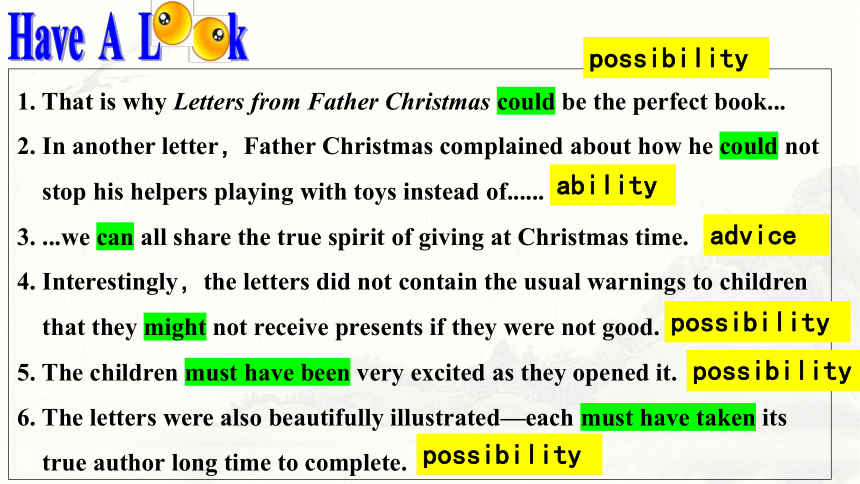
|
|
| 格式 | pptx | ||
| 文件大小 | 39.0MB | ||
| 资源类型 | 教案 | ||
| 版本资源 | 外研版(2019) | ||
| 科目 | 英语 | ||
| 更新时间 | 2024-03-18 09:55:21 | ||
图片预览

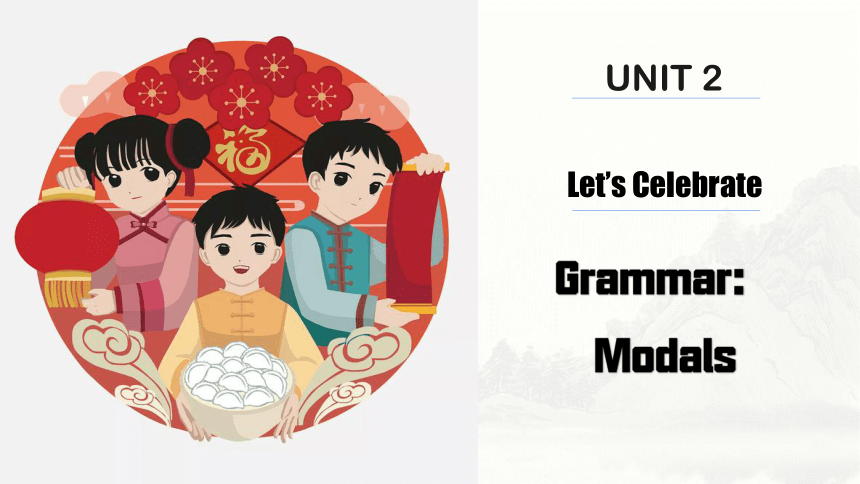
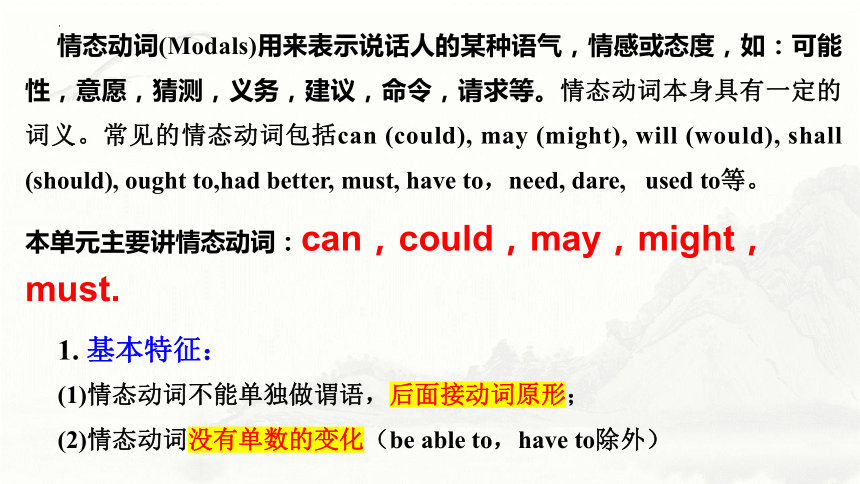
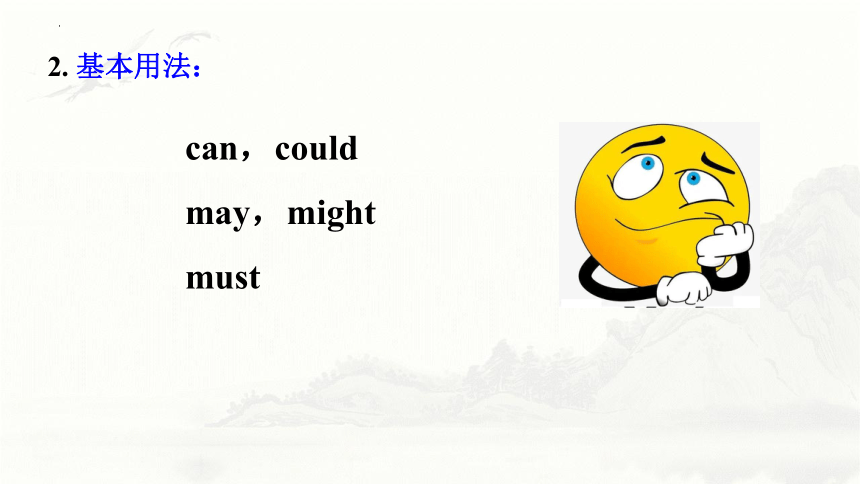

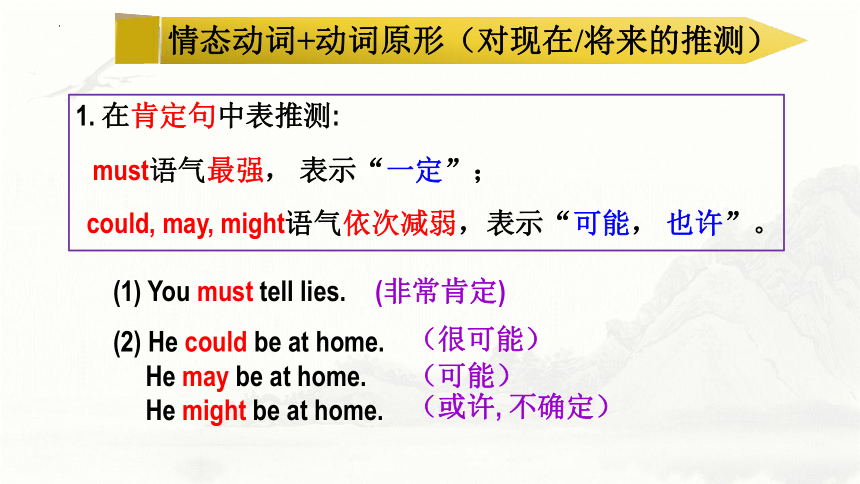
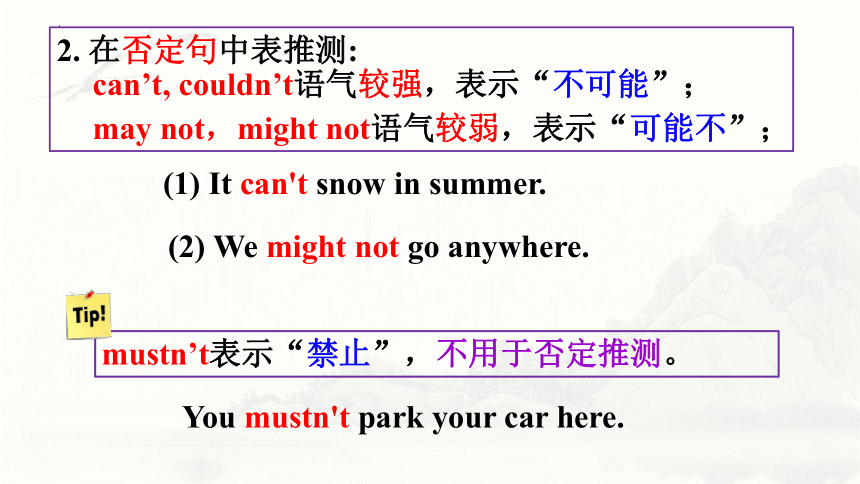
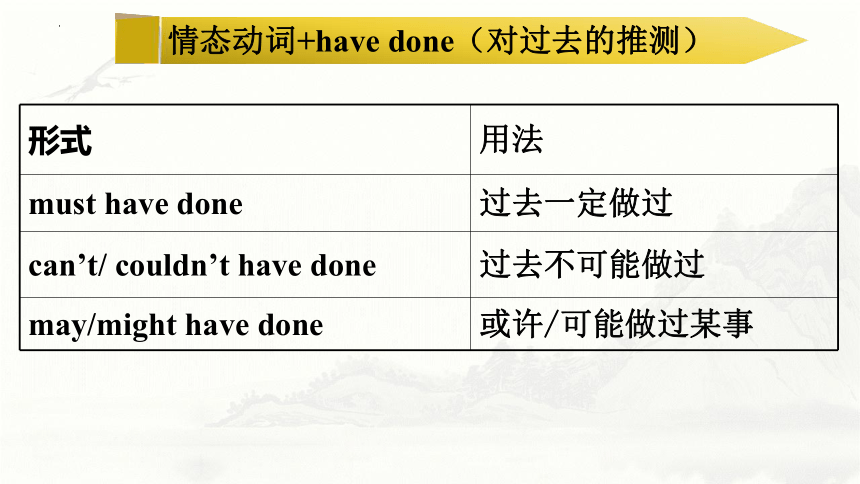
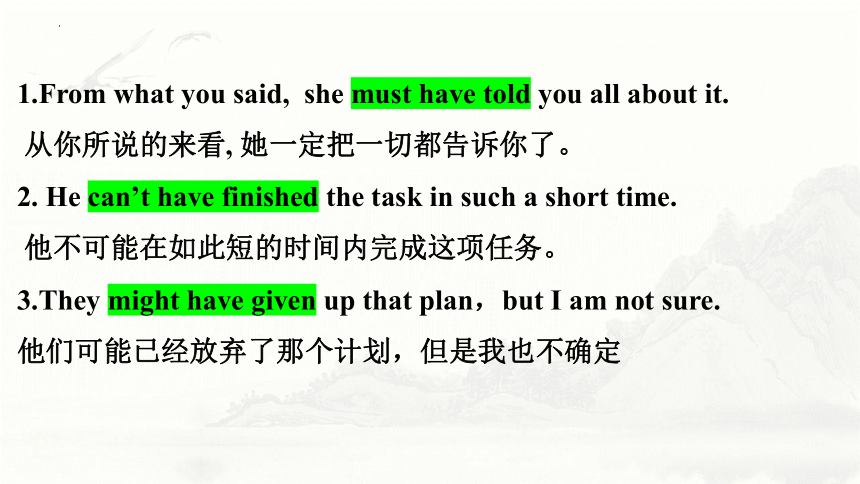
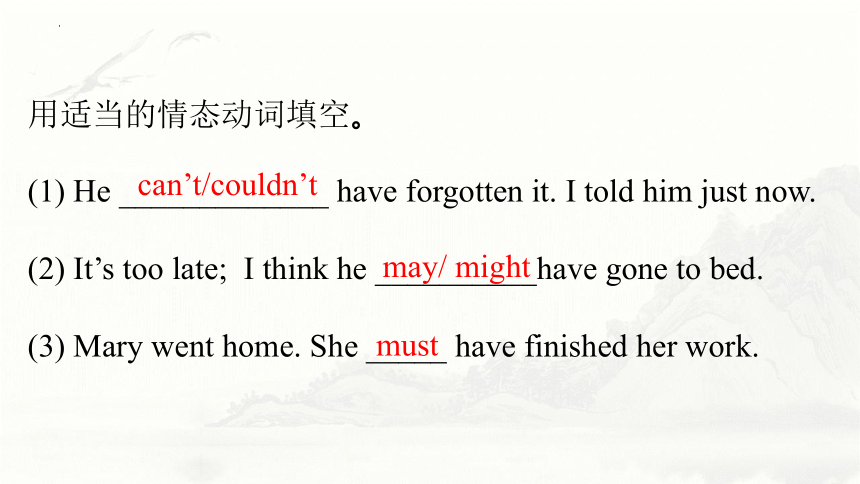
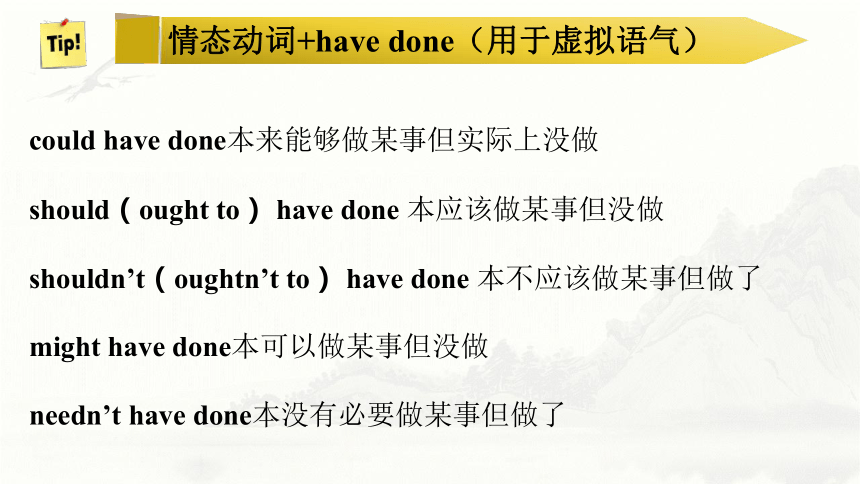
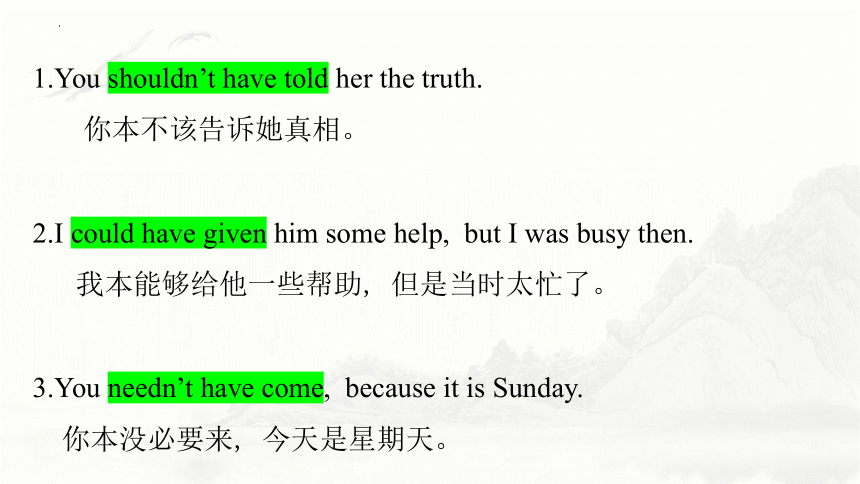
文档简介
(共41张PPT)
1. That is why Letters from Father Christmas could be the perfect book...
2. In another letter,Father Christmas complained about how he could not
stop his helpers playing with toys instead of......
3. ...we can all share the true spirit of giving at Christmas time.
4. Interestingly,the letters did not contain the usual warnings to children
that they might not receive presents if they were not good.
5. The children must have been very excited as they opened it.
6. The letters were also beautifully illustrated—each must have taken its
true author long time to complete.
possibility
ability
advice
possibility
possibility
possibility
Grammar:Modals
UNIT 2
Let’s Celebrate
情态动词(Modals)用来表示说话人的某种语气,情感或态度,如:可能性,意愿,猜测,义务,建议,命令,请求等。情态动词本身具有一定的词义。常见的情态动词包括can (could), may (might), will (would), shall (should), ought to,had better, must, have to,need, dare, used to等。
本单元主要讲情态动词:can,could,may,might,must.
1. 基本特征:
(1)情态动词不能单独做谓语,后面接动词原形;
(2)情态动词没有单数的变化(be able to,have to除外)
2. 基本用法:
can,could
may,might
must
一:情态动词表推测(possibility)
情态动词must, can, could, may, might等都有表推测的用法,都可以对过去,现在或将来的情况是否发生做出语气强弱不同的推测。
1.现在或将来:情态动词+动词原形
2.过去:情态动词+have done
1. 在肯定句中表推测:
(1) You must tell lies.
情态动词+动词原形(对现在/将来的推测)
(2) He could be at home.
He may be at home.
He might be at home.
could, may, might语气依次减弱,表示“可能, 也许”。
must语气最强, 表示“一定”;
(非常肯定)
(很可能)
(可能)
(或许, 不确定)
2. 在否定句中表推测:
(1) It can't snow in summer.
may not,might not语气较弱,表示“可能不”;
mustn’t表示“禁止”,不用于否定推测。
(2) We might not go anywhere.
You mustn't park your car here.
can’t, couldn’t语气较强,表示“不可能”;
形式 用法
must have done 过去一定做过
can’t/ couldn’t have done 过去不可能做过
may/might have done 或许/可能做过某事
情态动词+have done(对过去的推测)
1.From what you said, she must have told you all about it.
从你所说的来看, 她一定把一切都告诉你了。
2. He can’t have finished the task in such a short time.
他不可能在如此短的时间内完成这项任务。
3.They might have given up that plan,but I am not sure.
他们可能已经放弃了那个计划,但是我也不确定
用适当的情态动词填空。
(1) He _____________ have forgotten it. I told him just now.
(2) It’s too late; I think he __________have gone to bed.
(3) Mary went home. She _____ have finished her work.
can’t/couldn’t
may/ might
must
could have done本来能够做某事但实际上没做
should(ought to) have done 本应该做某事但没做
shouldn’t(oughtn’t to) have done 本不应该做某事但做了
might have done本可以做某事但没做
needn’t have done本没有必要做某事但做了
情态动词+have done(用于虚拟语气)
1.You shouldn’t have told her the truth.
你本不该告诉她真相。
2.I could have given him some help, but I was busy then.
我本能够给他一些帮助, 但是当时太忙了。
3.You needn’t have come, because it is Sunday.
你本没必要来, 今天是星期天。
3.Rewrite重写 the underlined划线的 sentences句子 in the conversation using can / could, may / might and must.
(At a fancy dress party化装舞会.)
Chris: I spent ages putting up all the balloons气球 and flowers last night.
Jean: I expect我想 you are feeling tired疲惫的 now!
Chris: Yes, I am. Look, that guy男子 is dressed as装扮成 Batman蝙蝠侠. ls that Mike
Jean: It's possibly可能 him. Check out that girl over there dressed as a
bride新娘. I'm sure我确定 that's Lucy.
Chris: No, I don't think我不认为 that's Lucy. Lucy isn't that tall.
Jean: Look at those two guys dressed as chickens! Oh, they're waving
at朝...挥手 us! Maybe也许 they're from our school.
Chris: Let's go and find out弄清楚.
(At a fancy dress party化装舞会)
Chris: I spent ages putting up all the balloons气球 and flowers last night.
Jean: I expect我想,我认为 you are feeling tired now!
Chris: Yes, I am. Look that guy is dressed as Batman. Is that Mike
Jean: It’s possibly him. Check out that girl over there.
I’m sure that’s Lucy.
You must be tired now!
It may/might/could be him.
That must be Lucy!
Chris: No, I don’t think我不认为 that’s Lucy. Lucy isn’t that tall.
Jean: Look at those two guys dressed as chickens!
Oh, they’re waving at us! Maybe they’re from our school.
Chris: Let’s go and find out.
that can’t be Lucy!
They may/might/could be from our school.
4.Look at the picture and make as many sentences as possible using can /could, may / might and must.
穿红色衣服in red的女人一定很开心要买如此多的东西。
can /could, may / might and must.
The woman in red must be very excited to buy so many things.
拿着钱包with a wallet的男人 可能不愿意reluctant付钱。
can /could, may / might and must.
The man with a wallet in his hand might be a bit reluctant不愿意的 to pay.
戴着眼镜的女人 可能很疲惫 因为起得太早而且拎了carry很多袋子。
can /could, may / might and must.
The woman in glasses may be very tired to get up so early and carry so many bags.
收银员cashier 一定很忙因为 有很多人排队in line结账check out.
can /could, may / might and must.
The cashier must be busy as there are a lot of people in line to check out.
这个店不可能在一个小时后关门close.
can /could, may / might and must.
The store can’t be closed in an hour.
(一)、情态动词can与could的用法
1. 表示能力:
can用来表示现在的能力, could表示过去的能力。
e.g. My grandmother can do some shopping on the Internet, but she couldn’t last year.
我奶奶会网购了, 但是去年她还不会。
二:情态动词的其他用法
2. 表示理论上或客观上的可能性, 意为“可能会,有时会”。
e.g. As a human being, anyone can make a mistake.
作为人类,任何人都有可能犯错。
Accidents can happy to any drunken driver.
任何醉酒的司机都有可能发生事故。
3. 表示推测, 意为“可能”。多用于否定句或疑问句。
e.g.—Can the news be true
——这个消息可能是真的吗
—It can’t be true.
——它不可能是真的。
4. 表示请求和许可: could语气比can委婉, 但回答时只能用can。
e.g. Can I go now
现在我可以走了吗
e.g.—Could I come to see you tomorrow
——明天我可以来看你吗
—Yes, you can.
——是的, 可以。
5. 习惯用法“cannot. . . too. . . ”表示“无论……都不过分, 越……越好”。有时cannot可用can never替代。
e.g. We cannot thank you too much for what you’ve done for us.
对于你们为我们所做的一切, 我们怎么感激你们都不过分。
eg:You can never be too careful.你越小心越好
选出下列句中can/could的含义。
A. 表示能力 B. 表示推测
C. 表示请求和许可 D. 表示理论或客观上的可能性
(1)Can/Could I use your dictionary
(2)He could not speak Italian .
(3)Mary couldn’t have received my letter, otherwise否则 she would have replied before now.
(4)Everybody can make mistakes.
(C)
(A)
(B)
(D)
(二)、情态动词may与might的用法
表示征求对方的同意或许可 2.或允许对方做某事(不用might) 。
e.g.—May/Might I play the computer games after supper
—Yes, you may. /No, you mustn’t/can’t.
——晚饭后我可以玩电脑游戏吗
——是的, 可以。/不, 不行。
e.g. You may choose whatever you like.
你喜欢什么就选择什么。
3. 表示推测(把握不大), 意为“可能”。(might比may可能性更小)
e.g. The traffic is very heavy these days. I may arrive a bit late, so could you save me a place
这些天交通很拥挤, 我可能会来晚一点, 请你帮我留个位置好吗
e.g. She might go out because the phone was ringing all the time.
她可能出去了, 因为电话一直在响。
4. may+主语+谓语, 表示祝愿。
e.g. May you succeed.
愿你成功。
5. “may/might as well+动词原形”表示“不妨, 还不如”。
e.g. It’s not very far, so we may/might as well go on foot.
那地方不太远, 所以我们还是走着去吧。
选出下列句中may/might的含义。
A. 表示许可 B. 表示推测 C. 表示祝愿
(1)I think he may come tomorrow.
(2)May you good luck!
(3)May I watch TV now
(B)
(C)
(A)
(三)、情态动词must的用法
1. 表示“必须”, 语气比should, ought to(应该)强烈。其否定形式为mustn’t (不准; 禁止)。
e.g. You mustn’t do that, because you must keep your word.
你不能那么做, 因为你得遵守诺言。
eg:Students mustn’t fall in love during school.
上学期间学生禁止谈恋爱
【要点提示】
以must开头的一般疑问句的肯定回答中要用must, 否定回答中要用needn’t/don’t have to。
e.g.—Must I finish the paper today
—Yes, you must. /No, you needn’t/don’t have to.
——今天我必须完成论文吗
——是的, 你必须。/不, 你不必。
2. 表示有把握的肯定推测, 只能用在肯定句中, 意为“一定”; 否定推测用can’t(不可能)。
e.g. You have worked hard all day. You must be tired.
你辛苦工作一整天了, 一定累了。
eg:You can’t be serious.你不是认真的吧。
3. 表示感彩, 意为“非得; 偏要”, 常指令人不快的事情。
e.g. The car must break down just when I was about to start.
我正要出发时车偏偏抛锚了。
eg:Why must you always be unnatural!你为什么非得这么不近人情呢?
选出下列句中must/mustn’t的含义。
A. 表示“必须”
B. 表示“一定; 准是”
C. 表示“偏要; 硬要; 偏偏”
D. 表示“禁止, 不许, 不准”
(1)You mustn’t leave the room without my permission允许.
(2)Why must you always interrupt打断 me
(3)You must be hungry after all that walking.
(4)You must practice your spoken English if you want to improve.
(D)
(C)
(B)
(A)
Ⅰ. 用适当的情态动词填空
1. Where did you go I ______ __ find you just now.
2. You ___ _ take whatever you like.
3. You __________ as well stay where you are and it is easy for me to find you.
4. —____ _ I hand in my homework tonight
—No, you _____ __. You __ __ hand it in tomorrow.
5. He speaks English fluently. He ___ __ have learned English before.
couldn’t表能力
may/can表许可
may/might
Must必须
needn’t不必
can/may表许可
must
6. You _____ be too careful to cross the road.
7. Generally speaking, it is warm in spring
but it __ __ be very cold in some areas.
8. __ __our friendship last long.
9. Why ___ __ you smoke in the meeting room
can’t
can理论上可能会
May表祝愿
must非得
Ⅱ. 完成句子
1. It is cloudy and cold. It ________ _later this afternoon.
天气阴冷, 今天下午可能会下雪。
2. Don’t scold him for his mistake again. Anybody _________________.
不要因为他的错误再批评他了, 任何人都可能犯错误。
3. You ____________________here or you will be fined.
你禁止把车停在这里, 否则你会被罚款的。
4. The old man is so tired that he _______any farther.
这位老人非常累, 以至于再也不能走得更远了。
may/could/might snow
can make mistakes
mustn’t park your car
can’t go
5. —May I use your ruler —Sorry, you _____.
——我可以用用你的尺子吗 ——抱歉, 你不能。
6. —________________how to get to the hospital
——你能告诉我怎么到达医院吗
—Of course, I ____.
——当然能。
7. ________________every day!
愿你天天快乐!
can’t
Could you tell me
can
May you be happy
8. When you are tired, you __________________and have a rest.
当你累了, 不妨坐下来休息一下。
9. He is very friendly to everyone but sometimes he ___________________.
他对每个人非常友好, 但是有时他很固执。
10. He is a good student but he ___________playing computer games.
他是个好学生,但是他偏偏喜欢玩电脑游戏。
may as well sit down
can be very stubborn
must like
1. That is why Letters from Father Christmas could be the perfect book...
2. In another letter,Father Christmas complained about how he could not
stop his helpers playing with toys instead of......
3. ...we can all share the true spirit of giving at Christmas time.
4. Interestingly,the letters did not contain the usual warnings to children
that they might not receive presents if they were not good.
5. The children must have been very excited as they opened it.
6. The letters were also beautifully illustrated—each must have taken its
true author long time to complete.
possibility
ability
advice
possibility
possibility
possibility
Grammar:Modals
UNIT 2
Let’s Celebrate
情态动词(Modals)用来表示说话人的某种语气,情感或态度,如:可能性,意愿,猜测,义务,建议,命令,请求等。情态动词本身具有一定的词义。常见的情态动词包括can (could), may (might), will (would), shall (should), ought to,had better, must, have to,need, dare, used to等。
本单元主要讲情态动词:can,could,may,might,must.
1. 基本特征:
(1)情态动词不能单独做谓语,后面接动词原形;
(2)情态动词没有单数的变化(be able to,have to除外)
2. 基本用法:
can,could
may,might
must
一:情态动词表推测(possibility)
情态动词must, can, could, may, might等都有表推测的用法,都可以对过去,现在或将来的情况是否发生做出语气强弱不同的推测。
1.现在或将来:情态动词+动词原形
2.过去:情态动词+have done
1. 在肯定句中表推测:
(1) You must tell lies.
情态动词+动词原形(对现在/将来的推测)
(2) He could be at home.
He may be at home.
He might be at home.
could, may, might语气依次减弱,表示“可能, 也许”。
must语气最强, 表示“一定”;
(非常肯定)
(很可能)
(可能)
(或许, 不确定)
2. 在否定句中表推测:
(1) It can't snow in summer.
may not,might not语气较弱,表示“可能不”;
mustn’t表示“禁止”,不用于否定推测。
(2) We might not go anywhere.
You mustn't park your car here.
can’t, couldn’t语气较强,表示“不可能”;
形式 用法
must have done 过去一定做过
can’t/ couldn’t have done 过去不可能做过
may/might have done 或许/可能做过某事
情态动词+have done(对过去的推测)
1.From what you said, she must have told you all about it.
从你所说的来看, 她一定把一切都告诉你了。
2. He can’t have finished the task in such a short time.
他不可能在如此短的时间内完成这项任务。
3.They might have given up that plan,but I am not sure.
他们可能已经放弃了那个计划,但是我也不确定
用适当的情态动词填空。
(1) He _____________ have forgotten it. I told him just now.
(2) It’s too late; I think he __________have gone to bed.
(3) Mary went home. She _____ have finished her work.
can’t/couldn’t
may/ might
must
could have done本来能够做某事但实际上没做
should(ought to) have done 本应该做某事但没做
shouldn’t(oughtn’t to) have done 本不应该做某事但做了
might have done本可以做某事但没做
needn’t have done本没有必要做某事但做了
情态动词+have done(用于虚拟语气)
1.You shouldn’t have told her the truth.
你本不该告诉她真相。
2.I could have given him some help, but I was busy then.
我本能够给他一些帮助, 但是当时太忙了。
3.You needn’t have come, because it is Sunday.
你本没必要来, 今天是星期天。
3.Rewrite重写 the underlined划线的 sentences句子 in the conversation using can / could, may / might and must.
(At a fancy dress party化装舞会.)
Chris: I spent ages putting up all the balloons气球 and flowers last night.
Jean: I expect我想 you are feeling tired疲惫的 now!
Chris: Yes, I am. Look, that guy男子 is dressed as装扮成 Batman蝙蝠侠. ls that Mike
Jean: It's possibly可能 him. Check out that girl over there dressed as a
bride新娘. I'm sure我确定 that's Lucy.
Chris: No, I don't think我不认为 that's Lucy. Lucy isn't that tall.
Jean: Look at those two guys dressed as chickens! Oh, they're waving
at朝...挥手 us! Maybe也许 they're from our school.
Chris: Let's go and find out弄清楚.
(At a fancy dress party化装舞会)
Chris: I spent ages putting up all the balloons气球 and flowers last night.
Jean: I expect我想,我认为 you are feeling tired now!
Chris: Yes, I am. Look that guy is dressed as Batman. Is that Mike
Jean: It’s possibly him. Check out that girl over there.
I’m sure that’s Lucy.
You must be tired now!
It may/might/could be him.
That must be Lucy!
Chris: No, I don’t think我不认为 that’s Lucy. Lucy isn’t that tall.
Jean: Look at those two guys dressed as chickens!
Oh, they’re waving at us! Maybe they’re from our school.
Chris: Let’s go and find out.
that can’t be Lucy!
They may/might/could be from our school.
4.Look at the picture and make as many sentences as possible using can /could, may / might and must.
穿红色衣服in red的女人一定很开心要买如此多的东西。
can /could, may / might and must.
The woman in red must be very excited to buy so many things.
拿着钱包with a wallet的男人 可能不愿意reluctant付钱。
can /could, may / might and must.
The man with a wallet in his hand might be a bit reluctant不愿意的 to pay.
戴着眼镜的女人 可能很疲惫 因为起得太早而且拎了carry很多袋子。
can /could, may / might and must.
The woman in glasses may be very tired to get up so early and carry so many bags.
收银员cashier 一定很忙因为 有很多人排队in line结账check out.
can /could, may / might and must.
The cashier must be busy as there are a lot of people in line to check out.
这个店不可能在一个小时后关门close.
can /could, may / might and must.
The store can’t be closed in an hour.
(一)、情态动词can与could的用法
1. 表示能力:
can用来表示现在的能力, could表示过去的能力。
e.g. My grandmother can do some shopping on the Internet, but she couldn’t last year.
我奶奶会网购了, 但是去年她还不会。
二:情态动词的其他用法
2. 表示理论上或客观上的可能性, 意为“可能会,有时会”。
e.g. As a human being, anyone can make a mistake.
作为人类,任何人都有可能犯错。
Accidents can happy to any drunken driver.
任何醉酒的司机都有可能发生事故。
3. 表示推测, 意为“可能”。多用于否定句或疑问句。
e.g.—Can the news be true
——这个消息可能是真的吗
—It can’t be true.
——它不可能是真的。
4. 表示请求和许可: could语气比can委婉, 但回答时只能用can。
e.g. Can I go now
现在我可以走了吗
e.g.—Could I come to see you tomorrow
——明天我可以来看你吗
—Yes, you can.
——是的, 可以。
5. 习惯用法“cannot. . . too. . . ”表示“无论……都不过分, 越……越好”。有时cannot可用can never替代。
e.g. We cannot thank you too much for what you’ve done for us.
对于你们为我们所做的一切, 我们怎么感激你们都不过分。
eg:You can never be too careful.你越小心越好
选出下列句中can/could的含义。
A. 表示能力 B. 表示推测
C. 表示请求和许可 D. 表示理论或客观上的可能性
(1)Can/Could I use your dictionary
(2)He could not speak Italian .
(3)Mary couldn’t have received my letter, otherwise否则 she would have replied before now.
(4)Everybody can make mistakes.
(C)
(A)
(B)
(D)
(二)、情态动词may与might的用法
表示征求对方的同意或许可 2.或允许对方做某事(不用might) 。
e.g.—May/Might I play the computer games after supper
—Yes, you may. /No, you mustn’t/can’t.
——晚饭后我可以玩电脑游戏吗
——是的, 可以。/不, 不行。
e.g. You may choose whatever you like.
你喜欢什么就选择什么。
3. 表示推测(把握不大), 意为“可能”。(might比may可能性更小)
e.g. The traffic is very heavy these days. I may arrive a bit late, so could you save me a place
这些天交通很拥挤, 我可能会来晚一点, 请你帮我留个位置好吗
e.g. She might go out because the phone was ringing all the time.
她可能出去了, 因为电话一直在响。
4. may+主语+谓语, 表示祝愿。
e.g. May you succeed.
愿你成功。
5. “may/might as well+动词原形”表示“不妨, 还不如”。
e.g. It’s not very far, so we may/might as well go on foot.
那地方不太远, 所以我们还是走着去吧。
选出下列句中may/might的含义。
A. 表示许可 B. 表示推测 C. 表示祝愿
(1)I think he may come tomorrow.
(2)May you good luck!
(3)May I watch TV now
(B)
(C)
(A)
(三)、情态动词must的用法
1. 表示“必须”, 语气比should, ought to(应该)强烈。其否定形式为mustn’t (不准; 禁止)。
e.g. You mustn’t do that, because you must keep your word.
你不能那么做, 因为你得遵守诺言。
eg:Students mustn’t fall in love during school.
上学期间学生禁止谈恋爱
【要点提示】
以must开头的一般疑问句的肯定回答中要用must, 否定回答中要用needn’t/don’t have to。
e.g.—Must I finish the paper today
—Yes, you must. /No, you needn’t/don’t have to.
——今天我必须完成论文吗
——是的, 你必须。/不, 你不必。
2. 表示有把握的肯定推测, 只能用在肯定句中, 意为“一定”; 否定推测用can’t(不可能)。
e.g. You have worked hard all day. You must be tired.
你辛苦工作一整天了, 一定累了。
eg:You can’t be serious.你不是认真的吧。
3. 表示感彩, 意为“非得; 偏要”, 常指令人不快的事情。
e.g. The car must break down just when I was about to start.
我正要出发时车偏偏抛锚了。
eg:Why must you always be unnatural!你为什么非得这么不近人情呢?
选出下列句中must/mustn’t的含义。
A. 表示“必须”
B. 表示“一定; 准是”
C. 表示“偏要; 硬要; 偏偏”
D. 表示“禁止, 不许, 不准”
(1)You mustn’t leave the room without my permission允许.
(2)Why must you always interrupt打断 me
(3)You must be hungry after all that walking.
(4)You must practice your spoken English if you want to improve.
(D)
(C)
(B)
(A)
Ⅰ. 用适当的情态动词填空
1. Where did you go I ______ __ find you just now.
2. You ___ _ take whatever you like.
3. You __________ as well stay where you are and it is easy for me to find you.
4. —____ _ I hand in my homework tonight
—No, you _____ __. You __ __ hand it in tomorrow.
5. He speaks English fluently. He ___ __ have learned English before.
couldn’t表能力
may/can表许可
may/might
Must必须
needn’t不必
can/may表许可
must
6. You _____ be too careful to cross the road.
7. Generally speaking, it is warm in spring
but it __ __ be very cold in some areas.
8. __ __our friendship last long.
9. Why ___ __ you smoke in the meeting room
can’t
can理论上可能会
May表祝愿
must非得
Ⅱ. 完成句子
1. It is cloudy and cold. It ________ _later this afternoon.
天气阴冷, 今天下午可能会下雪。
2. Don’t scold him for his mistake again. Anybody _________________.
不要因为他的错误再批评他了, 任何人都可能犯错误。
3. You ____________________here or you will be fined.
你禁止把车停在这里, 否则你会被罚款的。
4. The old man is so tired that he _______any farther.
这位老人非常累, 以至于再也不能走得更远了。
may/could/might snow
can make mistakes
mustn’t park your car
can’t go
5. —May I use your ruler —Sorry, you _____.
——我可以用用你的尺子吗 ——抱歉, 你不能。
6. —________________how to get to the hospital
——你能告诉我怎么到达医院吗
—Of course, I ____.
——当然能。
7. ________________every day!
愿你天天快乐!
can’t
Could you tell me
can
May you be happy
8. When you are tired, you __________________and have a rest.
当你累了, 不妨坐下来休息一下。
9. He is very friendly to everyone but sometimes he ___________________.
他对每个人非常友好, 但是有时他很固执。
10. He is a good student but he ___________playing computer games.
他是个好学生,但是他偏偏喜欢玩电脑游戏。
may as well sit down
can be very stubborn
must like
